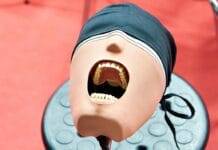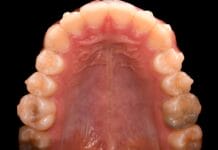Dental hygiene school can be grueling from that first prerequisite class to clinicals, and all the way through regional and national boards. Long days are followed by late nights forged with blood, sweat, and tears.
Yet, it seems some individuals are more immune to the pressures and rigors of college life than others. Why is that? Working as a professor at a dental hygiene college, and I have noticed an inspiring phenomenon. The most successful students don’t succeed because of natural raw talent or above-average intelligence.
These students do have an edge, but it isn’t a special ability or gift. Instead, I believe it’s a mindset that can be learned and developed. Here are seven traits or attitudes that I observe in students who not only survive hygiene school but flourish.
1) Be Teachable
This is the number one quality I see in those who’ve found success in hygiene school. Being amenable, having an open mind, and being receptive to new ways of thinking isn’t always easy. But put into practice, being teachable can pay off.
Others are more likely to share valuable skills and information if you are willing to receive. Instructors are typically eager to share and spend time with students who display a positive attitude and who are proactive with their own learning. Those who get defensive, who resist input, who fight the learning process only stunt their progress. In each situation, ask yourself about how you can improve.
Working in collaboration with others requires cooperation and vulnerability. Bringing your own perspective and experiences can be a valuable contribution to the learning process for both you and those around you.
2) Don’t Be Afraid of Failure
Expecting perfection is only setting yourself up for disappointment. We learn from our mistakes and not allowing ourselves to make mistakes can inhibit our growth. Grades are important in hygiene school—no doubt about it. Growth and learning are often difficult to measure by simply memorizing and regurgitating information.
Rather than simply aiming for good scores, focus on the small victories—and yes, even failures—earned daily. Each success and failure are something gained. Keeping a journal can help you track your progress. Having straight A’s or being valedictorian looks great on a resume, but being resilient, overcoming hardship, and being a well-rounded hygienist is also something to be proud of.
When asked what kind of hygienist they’re looking to hire, most dentists I’ve surveyed have overwhelmingly said they hire based on personality over any other hard skill or accolade. Personality traits like being dedicated, hard-working, or having a sense of humor are refined through successes and failures.
3) Be Present and Ban the Built
Take care of business ahead of time so that when you’re at school, you can stay focused. Stay off your cell phone and pay attention. Likewise, schedule time for family and friends and when you’re with them, forget about biofilm, Sharpey’s fibers, and that you desperately need three quads of a Level Four.
Instead of obsessing about the C minus you received on your pharmacology exam, look your tiny daughter in the eyes with your hands on her cheeks, and listen to how she accidentally wheeled her tricycle over the roly-poly and how it made a cracking noise. Mourn with her, cause—dang! Refuse to feel guilty about family time, and when you’re studying, refuse to feel guilty about that as well.
Remind yourself that your degree will benefit your entire family, possibly for generations to come.
4) Maintain Balance
Dental hygiene school is on the Richter scale somewhere between “I have no life” and “this too shall pass.” One of the best ways to survive hygiene school is to keep school where it belongs—in perspective. Those students who thrive are those who see the big picture. They are dedicated, study, and plan their time accordingly.
But these students also have balance, making time for family, friends, and the community. Their attitude reflects their priorities. They find joy in the journey and are pleasant to be around because school does not own them. Remember that the time spent in hygiene school is only a few years compared to the decades you will spend reaping the rewards of your hard work and sacrifice.
5) Believe that Your Instructors Truly Want the Best for You
Even 20 years later, I still acknowledge that dental hygiene school is one of the hardest things I’ve ever accomplished. You’ve got overachieving instructors teaching overachieving students, and both are monitored by an overachieving administrator. Talk about pressure!
On a serious note, I can assure you that, despite how tenacious your instructors are, they want you to succeed. I would go so far as to say that’s why they’re pushing you. Successful students take this in stride rather than push back and resent it. Knowing your professors have high expectations means they believe you are capable. They are preparing you for boards and to be an excellent hygienist. Take advantage of their skills and expertise as mentorship moments can offer clarity and insights otherwise missed.
6) Keep Going
Each day, each test, each quarter presents a new challenge filled with obstacles. You’re going to get sick, your boyfriend may break up with you, daycare will be impossible to find, and you’ll think you have ANUG. Hard things will come at the most inopportune times. You will doubt, cry, and want to quit. All of this is normal.
The obstacles don’t mean you’re doing something wrong. An education is hard won in an already difficult world. Acknowledge this, and the challenges won’t feel like a personal attack.
7) Remember your “Why”
Why did you want to become a hygienist? Are you a single mom? Has it always been your dream job? Do you love teeth? By all standards, dental hygiene is an excellent career choice, and hopefully, one you’ll love.
By joining the ranks of past and present dental hygienists, you’ll know you have accomplished something challenging and something to be extremely proud of. You’ll be making a difference in the lives of others and providing a living for you and your family. Whatever dental hygiene means to you—freedom, income, helping others—it will be worth it. Keep your eye on the prize by remembering your why, and know you have it in you to accomplish anything you work hard for.
Before you leave, check out the Today’s RDH self-study CE courses. All courses are peer-reviewed and non-sponsored to focus solely on high-quality education. Click here now.












